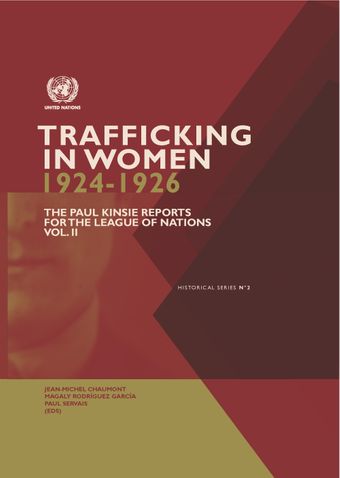Colonial regulationist prostitution in the Maghreb and the struggle for abolition

- Author: Christelle Taraud
- Main Title: Trafficking in Women (1924-1926) , pp 126-131
- Publication Date: July 2017
- DOI: https://doi.org/10.18356/26f6ad16-en
- Language: English
The issue of prostitution in the colonial Maghreb (North-Western Africa) is closely linked to the beginning of the French presence (1830 for Algeria, 1881 for Tunisia and 1912 for Morocco) and to the establishment of a regulationist capitalistic and racialized system. Imposed in Algeria from the onset of the conquest — the first police service and safety organization was created in Algiers on 13 July 1830, only eight days after the seizure of the city by the French expeditionary force — colonial regulationism gradually extended to all the North African territories under French control. The system was organized around a single status for prostitutes — that of “subjected girls” (filles soumises) — with specific locations for the venal sexual exchange (i.e. European brothels and red-light districts marked as “indigenous”). The objective, as in France, was to establish a sex market that would be both profitable and moral. It included the establishment of true sexual Taylorism inside slaughterhouses and a requirement for prostitutes to be “good winners and bad pleasure-seekers” (bonnes gagneuses and mauvaises jouisseuses), as recalled by the father of French regulationism, Alexandre Parent-Duchâtelet in his famous book De la prostitution dans la ville de Paris (Prostitution in the city of Paris), published in Paris posthumously in 1836. Prostitutes were only a minority at the dawn of the French presence — North Africans then having other modes for the legal regulation of sexuality such as polygamy and repudiation, a network of courtesans and slavery that allowed for legal concubinage — in a regulated system their number would gradually grow and expand over the French colonial landscape in the Maghreb. Moreover, regulationism would not be abolished in Algeria, Morocco or Tunisia until the countries’ rise to independence between 1956 and 1962. There is thus a structural link between colonization and French regulationism, demonstrated by the fact that France did not apply the 1946 law named after Marthe Richard (which had abolished brothels in the metropolis), passed on 13 April in the Chamber of Deputies, to its North African territories owing to its supposed “state of lower civilization from the perspective of morals” and for the same reasons, did not ratify the United Nations Convention for the Suppression of the Traffic in Persons and of the Exploitation of the Prostitution of Others of 1949 — despite having initially signed it — until the 1960s.
-
From This Site
/content/books/9789210601566s001-c033dcterms_title,dcterms_subject,pub_keyword-contentType:Journal -contentType:Contributor -contentType:Concept -contentType:Institution105


